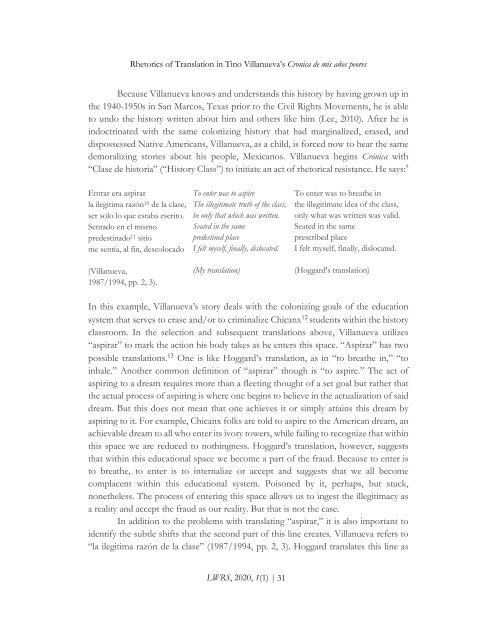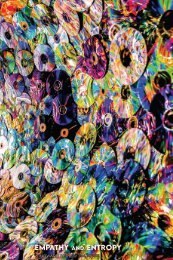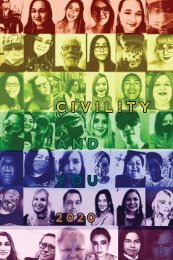LWRS June 2020 Volume 1, Issue 1
Inaugural Issue co-edited by Yndalecio Isaac Hinojosa and Isabel Baca
Inaugural Issue co-edited by Yndalecio Isaac Hinojosa and Isabel Baca
You also want an ePaper? Increase the reach of your titles
YUMPU automatically turns print PDFs into web optimized ePapers that Google loves.
Rhetorics of Translation in Tino Villanueva’s Cronica de mis años peores<br />
Because Villanueva knows and understands this history by having grown up in<br />
the 1940-1950s in San Marcos, Texas prior to the Civil Rights Movements, he is able<br />
to undo the history written about him and others like him (Lee, 2010). After he is<br />
indoctrinated with the same colonizing history that had marginalized, erased, and<br />
dispossessed Native Americans, Villanueva, as a child, is forced now to hear the same<br />
demoralizing stories about his people, Mexicanos. Villanueva begins Crónica with<br />
“Clase de historia” (“History Class”) to initiate an act of rhetorical resistance. He says: 9<br />
Entrar era aspirar<br />
la ilegitima razón 10 de la clase,<br />
ser solo lo que estaba escrito.<br />
Sentado en el mismo<br />
predestinado 11 sitio<br />
me sentía, al fin, descolocado<br />
(Villanueva,<br />
1987/1994, pp. 2, 3).<br />
To enter was to aspire<br />
The illegitimate truth of the class,<br />
be only that which was written.<br />
Seated in the same<br />
predestined place<br />
I felt myself, finally, dislocated.<br />
(My translation)<br />
To enter was to breathe in<br />
the illegitimate idea of the class,<br />
only what was written was valid.<br />
Seated in the same<br />
prescribed place<br />
I felt myself, finally, dislocated.<br />
(Hoggard's translation)<br />
In this example, Villanueva’s story deals with the colonizing goals of the education<br />
system that serves to erase and/or to criminalize Chicanx 12 students within the history<br />
classroom. In the selection and subsequent translations above, Villanueva utilizes<br />
“aspirar” to mark the action his body takes as he enters this space. “Aspirar” has two<br />
possible translations. 13 One is like Hoggard’s translation, as in “to breathe in,” “to<br />
inhale.” Another common definition of “aspirar” though is “to aspire.” The act of<br />
aspiring to a dream requires more than a fleeting thought of a set goal but rather that<br />
the actual process of aspiring is where one begins to believe in the actualization of said<br />
dream. But this does not mean that one achieves it or simply attains this dream by<br />
aspiring to it. For example, Chicanx folks are told to aspire to the American dream, an<br />
achievable dream to all who enter its ivory towers, while failing to recognize that within<br />
this space we are reduced to nothingness. Hoggard’s translation, however, suggests<br />
that within this educational space we become a part of the fraud. Because to enter is<br />
to breathe, to enter is to internalize or accept and suggests that we all become<br />
complacent within this educational system. Poisoned by it, perhaps, but stuck,<br />
nonetheless. The process of entering this space allows us to ingest the illegitimacy as<br />
a reality and accept the fraud as our reality. But that is not the case.<br />
In addition to the problems with translating “aspirar,” it is also important to<br />
identify the subtle shifts that the second part of this line creates. Villanueva refers to<br />
“la ilegitima razón de la clase” (1987/1994, pp. 2, 3). Hoggard translates this line as<br />
<strong>LWRS</strong>, <strong>2020</strong>, 1(1) | 31





